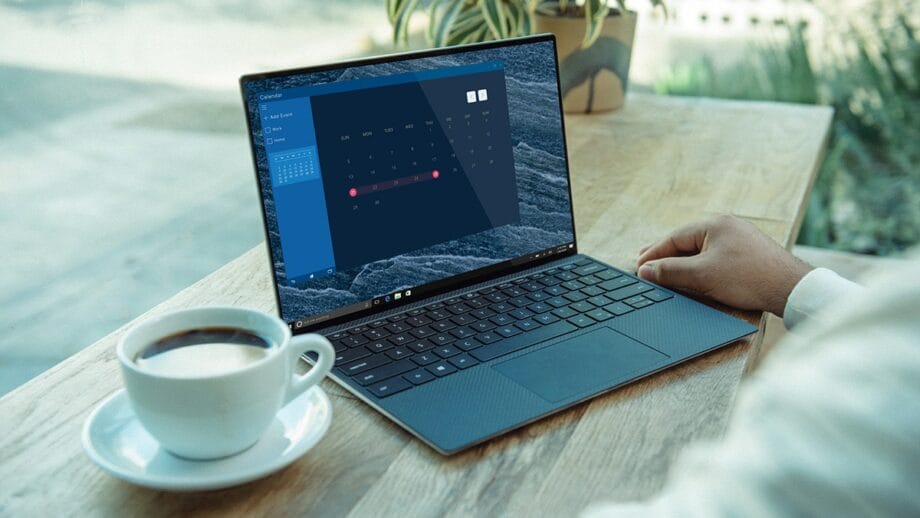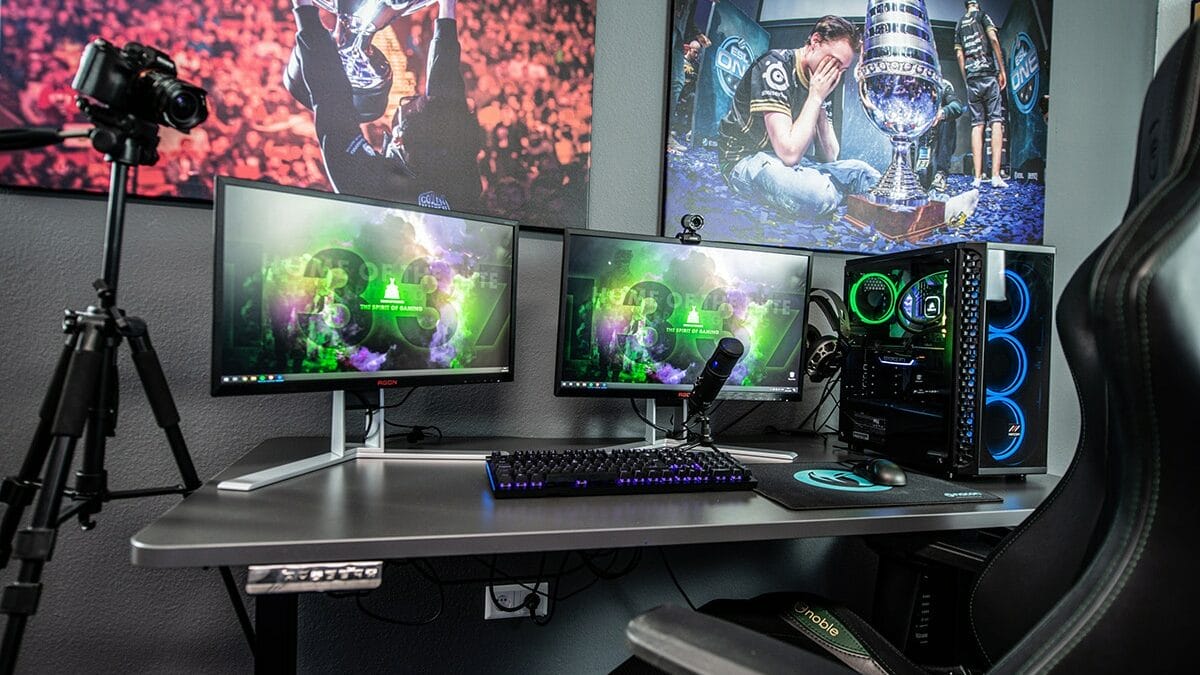Are you stuck choosing between a laptop computer and a desktop PC? You’re not alone – many technology users puzzle over this decision. Both devices help us surf the internet, do creative work, go on Zoom video calls, or play games.
But their strengths (and weaknesses) differ in big ways.
Did you know laptops use less power than desktops? They save energy and money because they run well even without heavy cooling systems or large power supplies.
In this blog post, I’ll clearly show you the advantages and disadvantages of laptops, such as portability and wireless connectivity, limited upgradability, and weaker gaming performance compared to desktop computers.
By the end, you’ll easily decide if a laptop is right for your needs. Ready to learn more? Keep reading!
What is a Laptop?

A laptop is a compact computer you can carry around easily. It weighs as little as two pounds and has all essential parts built-in, like screen, keyboard, trackpad, motherboard, graphics card (GPU), and its own battery power.
Laptops consume just about 20 to 50 watts of energy – far less than desktop PCs – and let you work or watch videos anywhere from cafes to parks.
Unlike desktop computers, stuck in one spot with tower cases and wired connections, laptops give users freedom through wireless connectivity like Wi-Fi or Bluetooth. Good battery life also matters since you’ll want your device ready for use even when you’re far from an AC adapter or docking station.
Popular examples today include models such as Dell Inspiron, convertible laptops like the HP Spectre series (“stylish,” aren’t they?), detachable hybrid laptops, gaming laptops that handle video editing tasks smoothly thanks to powerful GPU setups (such as Intel Iris Xe), webcams useful for video conferencing on the go – and yes…even special laptop bags designed specifically to protect these handy devices!
“The laptop brings computing out into the world – anywhere you choose.”
What is a Desktop Computer?

A desktop computer is a strong personal computer that stays in one place. You will usually find it at home or in an office. Desktops have many parts that work together, like a keyboard, mouse, monitor, and the main box called the tower (where the CPUs and GPUs are stored).
The big tower gives desktops room for powerful hardware such as large storage capacity drives and high-quality power supply units.
Desktops let you easily swap out parts to boost speed or performance yourself, like adding more RAM or getting better GPUs for gaming or video editing. Repairing desktops costs less because you often don’t need to buy new components.
But keep in mind, these machines use more energy due to their stronger parts, like fans and heat sinks, made for cooling efficiency.
Top 6 Advantages of Laptops over Desktops

Laptops offer a grab-and-go convenience – with built-in batteries, wireless connections like Wi-Fi and Bluetooth, and compact designs – to make your digital tasks as easy (and fun) as possible; curious about even more perks laptops have over desktops?…then stay tuned!
1. Portability
Portability is a huge advantage of laptop computers. You can do your work, play games, or send electronic mail from almost any place you want. Last week, I took mine to a coffee shop and finished editing videos right there (it weighed just two pounds!). A built-in battery lets you use it without plugging into power all the time.
“Having a laptop means my office travels with me – no cords needed.”
2. Wireless Connectivity
Laptops come with built-in Wi-Fi and Bluetooth, which makes wireless connectivity easy. You can quickly access the internet without HDMI cables or USB ports for wired setups. With wireless capability, you don’t need fixed Ethernet links for desktops to stay online.
Grab your laptop and move from your desk to a cafe table or even outdoors (why not?), keeping a steady internet connection anywhere.
Besides simple internet hookups, laptops let you pair other devices like smartphones and mice through Bluetooth. This helps keep your workspace free of cable clutter (“thank goodness!”).
Wireless tools like docking stations make it easier to switch between work areas without losing connection – great news if you often change spots during the day.
3. Ease of Assembly
I still recall my first desktop setup – countless cables, a maze behind the desk, and checking each connection twice (“Did I miss something?”). But with notebooks, it’s so simple you could do it blindfolded.
Just open the lid, press power to boot up, and within seconds you’re surfing wirelessly online or even jumping straight into video editing tasks. The built-in battery means no need for extra plugs like desktop computers require.
This compact design with integrated functionality makes laptops user-friendly for anyone, from tech-savvy teens to grandparents figuring out their first computer systems. No number pad connects separately; no storage capacity drives plug-in; everything you need is right there at your fingertips without tangled cords messing things up.

4. Energy Efficiency
Laptops use less energy than desktop computers. A laptop usually takes around 20 to 50 watts of power, so it saves money on your electricity bill each month. My own built-in battery lasts hours without needing a charge (helpful when I’m working in cafés).
Desktop computers draw more power due to their strong components and larger storage capacity. Laptops focus on saving that juice – they’re made exactly for users who care about energy efficiency and battery life.
Less power means lower bills, meaning laptops keep both your wallet and the planet happy!
5. Aesthetic and Space-Saving Design
These sleek machines have a compact design and need very little space. Unlike bulky desktop computers, notebooks easily fit into small work areas or tight places at home. With clean lines and modern looks, these devices match any style you want in your room or office.
No more messy cables and big computer towers cluttering desks. A notebook helps you keep things neat, leaving extra desk space free for other important items like notes or coffee mugs (“because who doesn’t love coffee next to their workspace?”).
Their built-in battery also gets rid of large uninterruptible power supply (UPS) units taking up precious room under the table.
6. Integrated Functionality
Laptops combine many computer parts into a single, compact design. They have built-in keyboards, screens, speakers, and webcams for video chats. This all-in-one style cuts down desk clutter and saves space.
Built-in batteries even let you work without plugging into power outlets. Wireless connectivity helps keep cords under control too – great if you hate messy setups (“I sure do!”). In short, integrated functionality makes laptops easy to use on the go at school or work (“or even that cozy coffee shop down the street”).
6 Main Disadvantages of Laptops over Desktops

Sure, laptops seem easy and fun – but desktops bring some strength that laptops just can’t touch (did someone say liquid cooling?). Let me tell you a few downsides of laptops that’ll make desktops smile.
1. Performance
Desktop computers usually pack stronger processors, bigger RAM, and better graphics cards. This lets them smoothly handle tough tasks like video editing or gaming without slowing down.
Laptops can sometimes struggle with heavy workloads – I know from personal use how frustrating it gets when my laptop slows mid-edit! Desktops are also built to maintain full strength even over long hours of intense use (think marathon gaming nights or day-long coding sessions).
So if power and speed matter to you most, desktops beat laptops every time for performance.
2. Cost-Effectiveness
Laptops usually cost more upfront than desktop computers with similar computing power. Smaller laptop parts are tougher and pricier to produce, which means you spend extra cash on compact design.
Repairs also tend to cost more for laptops due to their complex inner setup and limited upgradability.
By contrast, desktops keep your wallet happy over time thanks to cheaper repairs and upgrades. Their larger hardware parts can be replaced or upgraded at lower prices without hassle.
You get better performance per dollar spent, making desktops a strong pick if budget matters most in the long run.
3. Ease of Upgrades
If you like upgrading tech, desktops are your best friend. Desktop computers let you freely change graphics cards, motherboards, or cooling systems without hassle (“goodbye laggy video editing!”).
Desktops offer many options for upgrades over the years, to boost performance and storage capacity at lower costs.
In contrast, laptops have limited upgradability. Besides swapping out RAM sticks and solid-state drives (SSDs), there’s not much else to improve. I once tried replacing my laptop’s graphics chip – safe to say it didn’t end well (lesson learned!).
For longer use with better savings over time, desktops clearly win in ease of upgrade options compared to laptops.

4. Cooling Efficiency
Desktops have a clear edge in cooling efficiency. They use larger cases that allow air to flow freely and cool down parts fast. Laptops, with their compact design, often trap heat inside due to limited airflow and tight spaces.
Heavy tasks like gaming or video editing can make laptops overheat quickly, harming battery life and the lifespan of internal components.
Desktop computers manage heat better through bigger fans and more open spaces. This keeps performance stable even at high loads – great news for tech enthusiasts who stress their machines hard (“guilty as charged”).
With less efficient cooling methods, laptops need extra care (like laptop stands or fans) to stay cool under pressure.
5. Ergonomic Benefits
Comfort matters a lot, doesn’t it? With desktop computers, you can pick your own monitors, keyboards, and mice for greater ease. I learned this the hard way after hours of video editing on my laptop left me sore and tired.
Studies show desktops help users keep better posture than laptops do. Laptops often lead to poor alignment of the neck and shoulders because their screens can’t adjust freely from the keyboards.
That’s why desktops lower strain during long working sessions compared to laptops’ compact design that limits position choice (ouch!).
6. Wired Connectivity
Desktops win big in wired connectivity. They offer many ports to plug in devices like USB drives, keyboards, and monitors all at once. Ethernet ports on desktops mean stable internet connections, great for gamers needing top speed during video editing or online play.
Want to skip the hassle of losing Wi-Fi signals? Desktops use Ethernet cables that provide steady internet without breaks. With plenty of USB and HDMI options built in (unlike laptops’ limited upgradability), it’s easy to set up your ideal workspace or gaming rig.
Laptops vs. Desktops: Which One is Better for Whom?

Choosing between laptops and desktop computers depends on your work and lifestyle. Check out this clear list to help you pick the best option.
- Students: Laptops are great for students because portability lets them take work to class or study groups easily. Many models now have touchscreen features, making note-taking simple and fast.
- Remote Workers: If you work remotely, laptops give you the flexibility to join video calls from any spot with Wi-Fi or Bluetooth wireless connectivity (such as cafes or coworking spaces). I took mine out often – working outdoors is a nice change!
- Travelers: For frequent travelers, laptops win due to their compact design and built-in battery life; no need for large cases or desk setups while traveling.
- Sales and Marketing Professionals: Mobile professionals need quick access wherever they meet clients. Laptops offer wireless connectivity that allows easy presentations without tangled wires.
- Gamers: Most gamers prefer desktop computers since desktops deliver stronger performance, better cooling efficiency, and higher storage capacity for gaming setups (plus easier upgrades).
- Creative Professionals: Graphic designers, animators, or folks doing heavy editing tasks like video editing gain more power from desktops than laptops, especially when running multiple screens for large projects.
- Tech Enthusiasts and DIY Builders: Computer fans who love customizing gear prefer desktop computers due to ease of upgrades, better wired connectivity options (like USB-C ports), simpler cooling solutions, and easy access inside.
- Office Workers: Those at offices using specialized workstation programs choose standard desktop setups because these machines handle intensive tasks reliably all day, often connected directly to uninterruptible power supplies (UPS) so work won’t get lost if the lights flicker!
Conclusion

We covered the main perks and drawbacks of laptops compared to desktops. Are you after a compact design and wireless connectivity, or powerful hardware and easy upgrades? Laptops let you work anywhere, but they can limit your storage capacity and screen size.
Desktops offer cost-effective performance with better cooling for tasks like gaming or video editing. Take time to weigh these differences carefully; they will decide how well your tech fits your needs each day.
Whichever option suits your style best, make sure it helps you do more of what matters most!





